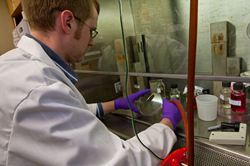Sources: Ryan Gallagher, moose303@k-state.edu;
and Stephen K. Chapes, 785-532-6795, skcbiol@k-state.edu
Photo available. Contact media@k-state.edu or 785-532-6415.
Video available. Access at http://www.k-state.edu/media/webzine/research/index.html
News release prepared by: Kristin Hodges, 785-532-6415, khodges2@k-state.edu
Tuesday, March 31, 2009
K-STATE'S NEWEST GOLDWATER SCHOLAR IS EXTENSIVE UNDERGRADUATE RESEARCHER IN IMMUNOLOGY
MANHATTAN -- Kansas State University's newest Barry M. Goldwater scholar is planning an extensive career in immunology research, and he jump-started his goal when he sought a lab assistant job as a freshman at K-State.
 Ryan Gallagher, junior in microbiology and premedicine, Olathe, has worked since his first year at K-State in an immunology laboratory with Stephen K. Chapes, professor of biology. Gallagher was recently named a 2009 Goldwater scholar, a national competition based on academic merit for math, science and engineering undergraduate students.
Ryan Gallagher, junior in microbiology and premedicine, Olathe, has worked since his first year at K-State in an immunology laboratory with Stephen K. Chapes, professor of biology. Gallagher was recently named a 2009 Goldwater scholar, a national competition based on academic merit for math, science and engineering undergraduate students.
Currently Gallagher is studying the biological role of a protein called CD81, which researchers think is an important component in organizing other molecules in the cell membrane. They think the protein also might facilitate the functioning of other molecules it partners with and help cells communicate with each other, Chapes said.
An area of Gallagher's research has involved determining if the CD81 genotype affects the production of CD81 knockout mice, which are mice that do not have the protein.
"Ryan, along with two other students, tested this hypothesis by monitoring the breeding and accumulating the data of more than 500 mice to determine that there was an impact of the father's CD81 genotype in the production of offspring," Chapes said.
Gallagher also is researching the role CD81 has in cell-cell communication and tumorigenesis, which is the production of tumors. He is working with cells that express CD81 and cells that do not express CD81, and is looking at different approaches to understanding the effects of cell density.
One approach involves using lipophilic dyes -- dyes with an affinity for other lipids -- to label groups of cells, such as a group of knockout cells and a group of heterozygote cells. When labeling the independently dyed groups and culturing them together, the cell density and the rates that they exchange the dye can be observed.
"Ryan has completed experiments that appear to show that the absence of CD81 affects how close cells will get to each other," Chapes said. "He is doing follow-up experiments to these observations to learn if CD81's ability to control cell density affects tumorigenesis."
Gallagher's research contributes to knowledge of the immune system since CD81 is important in cell-to-cell interactions. It's also important for understanding two important health aspects: fertility and oncogenesis, which is tumor development, Chapes said.
Gallagher has presented his research at the National IDeA Symposium of Biomedical Research Excellence in Washington, D.C., in August 2008, and in an oral presentation March 6 at the 14th annual K-State Research Forum.
His research was funded by the Kansas IDeA Network of Biomedical Research Excellence program and from a grant to the K-State Division of Biology from the Howard Hughes Medical Institute. He also has received funding from K-State's Terry C. Johnson Center for Basic Cancer Research. In addition, Gallagher has conducted research one summer in an immunology lab at the University of Kansas Medical Center.
Gallagher will have an article published in the June 2009 Journal of Comparative Medicine regarding the experimental autoimmune encephalomyelitis model, which is a mouse model of multiple sclerosis. He said he thinks his research experience will help him in medical school.
"It will certainly help me understand everything," Gallagher said. "I'm in Dr. Chapes immunology class right now, and the research experience and having looked at actual research papers makes it so much easier to understand things since I'm familiar with the format and with the ways ideas are presented."
Gallagher's interest in science began in his high school biology class. His instructor provided Saturday lab classes for students to learn basic research techniques. "We got to do things that you wouldn't typically expect to do in a high school class," he said.
He also is interested in art, specifically ceramics where he creates pots using a potter's wheel.
Gallagher plans to attend medical school and earn a doctorate in immunology. He would like a career that balances teaching and patient responsibilities with continued involvement in research.
"I want to contribute to the basic science field long term," he said. "It seems to me that things aren't really worth knowing if you're not helping someone."
At K-State, Gallagher is a member of the Alpha Epsilon Delta premedicine honorary society and a University Experience peer mentor. A 2006 graduate of Olathe East High School, he is the son of Don and Linda Gallagher, Olathe.